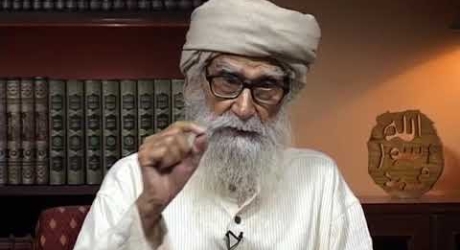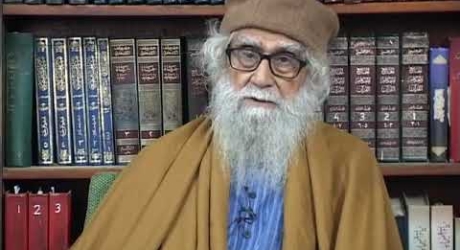A believer has been commanded to have patience in every situation. It is forbidden for him to hate anyone. Even if the others commit any oppression or wrong, the command is to tolerate and be patient to the extent of well-wishing and praying for the opponents’ good. These actions of a true believer will make him stronger and win over the hearts of his opponents and enemies. A person who treats every human interaction as an interaction with God will not commit any excesses in his behaviour. To curse or pray for the damnation of others is a relinquished practice of the Prophet, whereas well-wishing and presenting the divine message of God is the Prophet’s eternal Sunnah and practice.
Introduction
Today, I would like to talk about leading the life in accordance with Islamic principles. That is, adopting the Islamic way of life whether at home or outside. I would like to begin by citing two personal experiences.
The first incident took place many years ago at
My second experience was at Rishikesh, where I was invited to attend a conference organized by the Hindus. While addressing the gathering, I narrated some incidents from the life and times of the Prophet and his companions. For example, the Prophet said,
A true Muslim is one by whose hands and tongue people are safe. (Muslim)
This tradition exhorts a believer to live as a no-problem person in the society. According to another tradition, only two types of conduct are acceptable in Islamic way of living, that is
Stay in the society as a no-problem person; And if you can cause no benefit, ensure that you cause no harm. (Mishkat)
This means man may either stay as a no-problem person or as a giver member of the society. When I narrated this Hadith to my audience, they were surprised because until then, Islam had been synonymous to violence. I narrated another tradition according to which, Uthman ibn Affan, a companion of the Prophet used to take bath twice everyday contrary to the general perception that the Muslims take bath only on Fridays. Upon hearing this, Swami Chidanand, the author of the encyclopaedia of Hinduism told me that I should write a book entitled Islam in Daily Life and that they would publish it in ten languages and distribute it. This instance points at the true nature of man. According to the following verse of the Quran
Follow the nature as made by God, that nature in which He has created mankind.
There is no altering the creation of God. (30:30)
In other words, explanation of universal values addresses the human mind. The true face of Islam has a great appeal amongst all as against the militant-propagated religion, which portrays a false image of Islam. The term “Islam in daily life” does not indicate observance of rituals but explains how the teachings of Islam are associated with the daily life of man.
Ritual and Spirit
I had an experience today as I woke up in the morning and read the Morning Prayer (fajr namaz). I remembered a Hadith at this instance, which has been mentioned in both Bukhari and Muslim:
One who reads the Namaz at the two cold times (bardain) will enter
The Hadith means that when a person reads the prayers during normal environmental condition, he is able to apply his concentration as compared to someone who reads the prayer in hot weather conditions where sweat and heat do not let him concentrate. The two timings indicated in the Hadith are for the Asr and Fajr prayers. Nothing distracts a person when he reads Namaz during these two times. Thus the effect of reading the morning Prayer undistracted would remain till the evening and that of the evening Prayer would pass on to the next morning. In this way, the entire day gets taken care of.
The Hadith says that one who reads Namaz during these two times will enter
Those who are humble in their prayer (23:2)
Reading namaz is not a mere ritual; it is the manifestation of a spirit. This act of worship instills a sense of awe in the devotee. The prayer begins with ablution, that is, with the washing of the face, hands and feet. The bodily cleansing is a symbolic reminder that the Muslim should lead his life in this world in a state of purification of the feelings and the soul. While performing the ablutions, the heart of the devotee cries out and he prays, “God! just as this water has purified my body, in the same way You purify my soul. God I could only clean my body but my mind and soul can be purified by You alone.”
What is recited during prayer consists either of verses from the Qur’an or dhikr, remembrance, of God, and dua, invocations and supplications. All of this is aimed at bringing about a spiritual awakening such as will induce the worshipper to renounce his life of ignorance and heedlessness in favour of a life inspired by Islamic moral values.
Throughout the prayer (namaz) the phrase, Allah-o-Akbar (God is Great), is repeated atleast two hundred and fifty times. Implicit in these words is the idea that the person uttering them is not great. Their frequent repetition is a lesson in modesty, designed to rid the worshipper of arrogance. The worshipper is being is conditioned by namaz to surrender himself to his Maker in all humility.
The various postures in the namaz climax in the act of self-prostration — the ultimate demonstration of submission. Real proof of this submission to God will only become manifest, however, in subsequent dealings with other human beings, in which it is clear that self-glorification has been replaced by glorification of the Almighty, and that feelings of superiority have given away to profound humility.
The namaz ends with each worshipper turning his face sideways and uttering these words: “May God’s peace and blessings to upon you. Every day, all around the globe, Muslims perform these rites. It is as if they were saying to their fellow men all over the world: O people, we have no feelings for you but those of peace. Your lives, property and honour — all are safe. It is this spirit with which worshippers are enthused before they return to society.
Namaz therefore invokes a sense of peace and well-wishing for fellow human beings and makes man human-friendly. It is said that mohabbat fatih aalam (Love conquers the world) and this is the behaviour that will win over the hearts of people.
Namaz inculcates modesty
Modesty is the key to all kinds of success. It is a great quality, which opens the doors of opportunities and most of all paves way for divine inspiration to reach man. According to a Hadith,
One who is modest, God exalts him. (Mishkat)
During the namaz, a short prayer called “Surah Fatiha” is repeatedly recited. It reads
God I acknowledge your greatness
This prayer is an acknowledgement of the greatness of the Creator and Sustainer of man - He who gave life, bestowed the entire life support system and endowed man with a family. The importance of acknowledgment or aetraaf is conveyed in the following Hadith,
One who is not thankful to his fellow men, is not thankful to God either. (Abu Daud)
The above Hadith means that it is not possible for man to be thankful to God on one hand and be ungrateful towards his fellow men on the other. According to the Quran,
God has not placed two hearts in any man’s body. (33:4)
A sincere man is one who acknowledges both God and his fellow men. This behaviour makes man, complex free. Because, knowing that a person has done you good and not acknowledge him still builds complex. Namaz is a training course for the development of a purified soul. During a congregational prayer, one person is chosen as imam and the rest stand behind him in rows. In other words, one person takes the lead and the rest take a back seat. Accepting one person as the leader puts an end to all quarrels. Similar to the Japanese temperament: “I am under someone”, the spirit taught by congregational prayer is “I am under my imam.” Reading the namaz leads to the development of a paradisiacal personality. It makes man undergo a complete course in personality development and inculcates modesty, acknowledgement, peace, well-wishing and submission. According to the Quran,
That is the recompense for those who purify themselves. (20:76)
One who reads the morning and evening prayer with its spirit will become a deserving candidate for paradise.
Some Experiences
Today, the morning news reader reported that there is likelihood of heavy fog in
He has given you all that you asked of Him. (14:34)
All these items were potentially present even before man was born; he did not have to ask God for these. That is, God already knew the requirements of man and He filled the earth with these items of need, which existed either directly or potentially. It is a blessing of God that He gave all this without our asking. Thinking so makes man realize the blessings of God and the innumerable favours He has bestowed upon us. On thinking this, we become 100% positive about everything.
The next question that emerges is that who converted nature’s potential into actual? The answer is - western nations – all of us have been mere takers. In this sense, the western nations are our benefactors (mohsin). In other words, whatever was given by God to man in the form of potential was converted into actual by the West. The Quran says,
Whosoever has been blind in this life will be blind in the life to come. (17:72)
Muslims, who are negative about the West and think that they are paying the price of the Western products by giving money in return, are blind. Those who take things for granted and think that all of that which they possess is merely ‘purchasable’ by money are actually blind because these things that have been “bought” are so precious that no amount of bank balance can suffice to pay its price. Those who are negative about the West are blind. It was the duty of the Muslims to unravel the potential kept by God in nature. God says in the Quran,
God has subjected to you whatever is in the heavens and whatever is on the earth (31:20)
The Muslims had to convert the potential of nature into actual, but they couldn’t do so and the Western nations did it. Thus, the Muslims must thank the West instead of being negative about them. Islam in daily life is not to follow rituals but to live in an ocean of thankfulness and to develop a paradisiacal personality.











